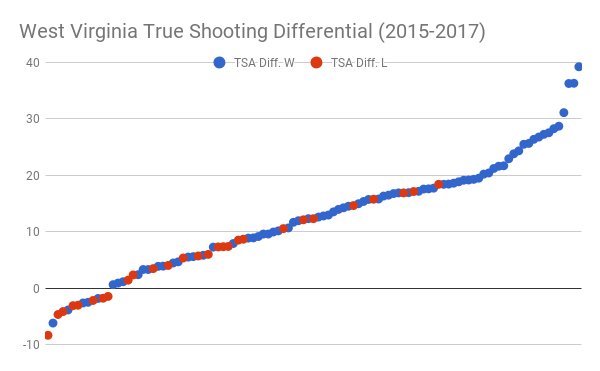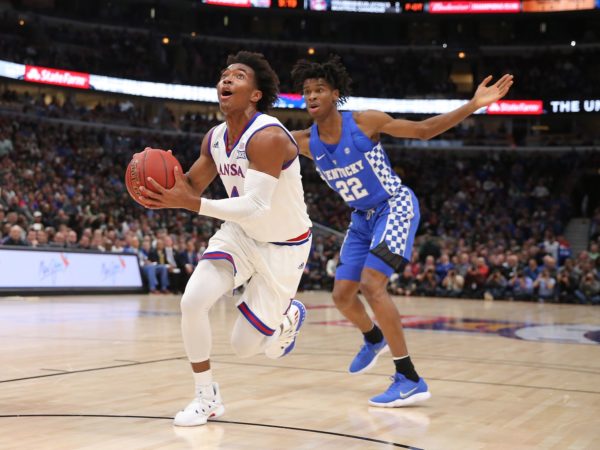Friday Figures: Big 12 Trends Worth Watching
Posted by Chris Stone on November 17th, 2017Welcome to Friday Figures, a new weekly column where we’ll look at some interesting statistics from around the Big 12. There will be charts, graphs and plenty of references to KenPom. Obviously it’s still early, so this week we’re going to dive into a trio of numbers worth tracking as the season progresses.
West Virginia’s true shooting attempts differential always looms large. Under the “Press Virginia” system, the Mountaineers’ offense has never been the most efficient from a shot-making perspective. Dating back to the 2014-15 season, West Virginia has ranked 292nd, 177th and 139th nationally in effective field goal percentage (per KenPom). So far this season, they rank 185th. But what West Virginia lacks in accuracy, it makes up for in sheer volume by creating extra shots with offensive rebounds and opponents’ turnovers. Last season, the gap between the Mountaineers’ true shooting attempts (TSAs), a formula which accounts for free throws as well as field goal attempts, and their opponents’ attempts, was the largest in the country at 11.3 per game.

Data source: Sports-Reference
Tracking that differential in TSAs on a game-by-game basis has been a pretty good way to figure out West Virginia’s chances of winning. The chart above plots every game the team has played since 2014-15 with losses marked in red. Notice how the presence of that color increases significantly when the differential falls below 10.0? In two games so far this season, the Mountaineers have experienced wildly different results. Against Texas A&M, they only took 1.2 more TSAs than the Aggies, but in a blowout win against American, that gap was 25.4. One was a 23-point loss while the other a 34-point win. If you’re tracking West Virginia’s box scores this season, simply observe the gap in field goal attempts and free throws versus the opponent and you will likely be able to figure out how the game is going.
Kansas needs to find a way to create easy points. Entering the season with an especially thin frontcourt, it was abundantly clear that the Jayhawks’ guards were going to have to carry the team’s offensive load once again. In 2016-17, that wasn’t much of a problem as both Frank Mason and Josh Jackson were high-volume shooters at the rim with an ability to get to the free throw line often. Attacking the basket was a quick way for Kansas to generate easy points. However, with Devonte’ Graham and Malik Newman — two players historically reliant on their jumpers — taking over the starting duties this season, keep an eye on how often Kansas is able to get to the rim and the foul line this season.
So far, the results have been mixed. The Jayhawks are actually taking a slightly higher percentage of their halfcourt field goal attempts at the rim this season (36.5% vs. 33.1%), per Hoop-Math, but their free throw rate is down significantly. Kansas currently ranks 319th nationally in the statistic, per KenPom, and it’s never finished worse than 193rd under the head coaching of Bill Self. If the Jayhawks aren’t able to create those easy points, things figure to be much more volatile offensively in Lawrence this season.
Whether Texas is going to move the ball more is still an open question. While the spotlight of the Longhorns’ recruiting class shined brightest on five-star center Mohamed Bamba, point guard Matt Coleman is arguably an equally important addition. Coleman theoretically gives Texas a pass-first point guard who can help facilitate an offense that was rather disjointed just a season ago. Watch their team assist rate in 2017-18 to see what kind of effect he’s having.
Last season, the Longhorns’ assisted on just 46.5 percent of their made baskets, the 301st worst mark nationally. Through two games this season, that number (45.5%) is slightly lower. However, in its win over Northwestern State, Texas assisted on 62.2 percent of its makes while scoring 1.38 points per possession. Coleman led the way with seven assists. Against New Hampshire, old habits returned as just 24.1 percent of the Longhorns’ makes were assisted and they scored 1.07 points per possession. Coleman led the team with three assists. It’s always tough to lump significant pressure on a freshman, but it’s already clear that Texas’ offense works much better when Coleman is facilitating it.










































